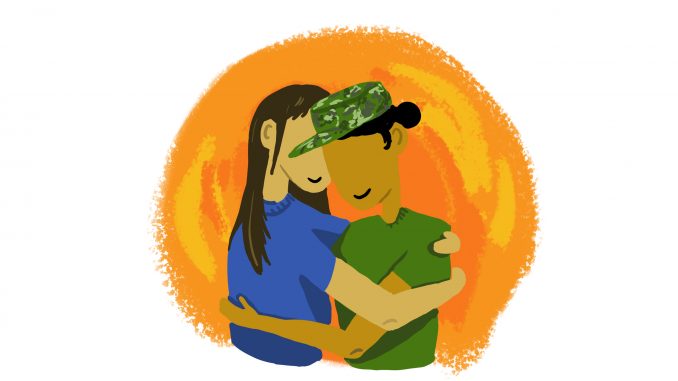
Just a few days shy of my 18th birthday, I was somewhere I never thought I’d be.
Longhorns ran down the road as my family and I made our way down the highway to Lackland Air Force Base in Texas.
When we arrived, we were greeted by armed military personnel. We made our way to a running track where we eagerly awaited the new airmen to come running out. Among them would be someone I hadn’t seen in almost a year — my older sister, Ashley.
When my sister told me she was joining the Air Force, I was shocked. Learning about the horrors of war in history classes as a kid had made me a staunch pacifist. My anti-war sentiments intensified after Sept. 11, 2001. I watched young Americans suffer and die while serving in wars in the Middle East. Newspapers and the TV showed bombings that maimed and murdered civilians in Afghanistan and Iraq. Then, torture practices at prisons, like Abu Ghraib in Iraq and Guantanamo Bay in Cuba, made me and the world critical of military action.
I came to see people in the military as people who liked war, something I could not fathom. It was difficult for me to picture Ashley like that, but I’ve found unlearning is just as important as learning.
To believe military members are enthusiastic agents of war was extreme bias. I had stereotyped members of the military without even knowing them.
And here was someone I love telling me this is the path she has chosen. Like many college-aged individuals, my sister struggled to find her purpose in life, so my lack of enthusiasm didn’t seem fair, as she always supported me.
Instead, I decided to learn about my sister’s work, and I found my prejudices replaced with knowledge. She explained she probably would not see combat, but everyone could be deployed. She would train for that possibility but more intensive training happened when she trained in her career field, a military occupational specialty.
In fact, she taught me that there are multiple career fields that a person can sign up for and many are not combat-related. I learned that many of my sister’s fellow airmen weren’t trying to see combat. Many, like my sister, had joined as a way to show gratitude for a country they felt had given their family an opportunity to thrive. Others also joined because the military offered them a path to economic security that they hadn’t been afforded before.
The most important thing I learned from my sister was empathy. We have all had to choose ways to secure our professional and financial future. For me, that was college. For my sister, that was the military. Our solutions may have been different, but the reasoning was the same.
When I met my sister’s friends in the Air Force, I was introduced to my now-fiance Carlos. He proudly decided that his future included two things: becoming a Marine and me. When he told me his ambitions, I asked him questions, as I had with my sister.
I found that, like my sister and her friends, he was joining to thank the country that had given his parents the opportunity to succeed when their home country hadn’t. It hasn’t always been easy, but when you love someone, supporting them — no matter what you personally believe — is a no-brainer.
Supporting members of our military, past and present, does not mean you support war. To me, pacifism is seeing war as a violent means of dividing people. I also believe that being a pacifist means promoting unity as a way to achieve peace and trying to understand others is the best way to do that.
The people in my life have always been the greatest teachers of this. I am and always will be a pacifist. I am and always will support our military. And yes, I can and will do both.



Be the first to comment